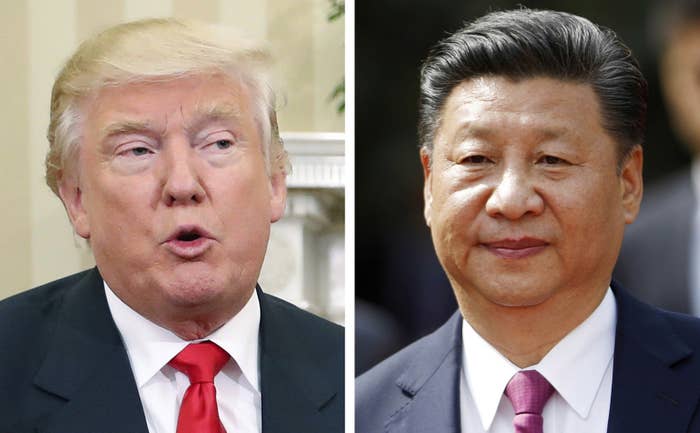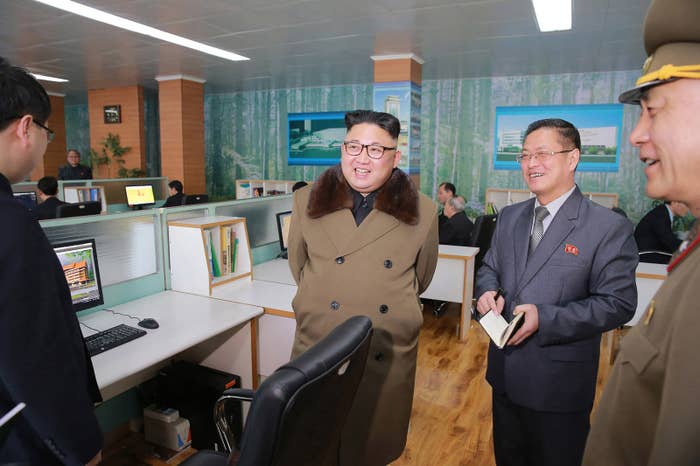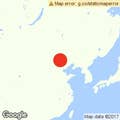
BEIJING — The theory goes like this: Parts of the US government — nobody is quite sure which parts, but parts nonetheless — have no desire for North Korea to give up its nuclear weapons program. They love North Korea’s nuclear weapons, the theory goes, because it provides a convenient excuse for the US to keep military assets in South Korea and Japan.
This might sound crazy if you’re in the US. US leaders from Bill Clinton, to George W. Bush, to Barack Obama have spent decades trying to persuade North Korea to give up its banned nuclear and ballistic missiles programs through endless rounds of talks and sanctions.
But in China, where suspicions of US motives in the region run deep and there is little faith in government transparency, the theory has been judged plausible by everyone from casual news consumers to journalists and academics with influence on North Korea policy.
“The US is using North Korea’s nuclear weapons as an excuse,” Lu Chao, director of the Border Study Institute at the Liaoning Academy of Social Sciences, a government think tank, told BuzzFeed News. “The real goal is strategic — it’s to reshape the balance of power in northeast Asia. That’s what I believe.”
That lack of trust underscores a key challenge for a new administration as it contends with an increasingly confident and aggressive North Korea. President Donald Trump has made clear he believes China has the power to shape North Korea’s behavior. But the festering mistrust between Washington and Beijing may prove to be a major obstacle to the two countries effectively working together to pressure Pyongyang.
The theory that the US is secretly rooting for Pyongyang’s nuclear program isn’t a mainstream viewpoint, according to Chinese journalists and academics. But the belief that the US approaches North Korea policy with a hidden motive — the containment of China — has become widely accepted in Chinese policymaking circles.
“Of course there is a lack of trust,” said Zhang Liangui, a professor at the Central Party School and one of the country’s top North Korea experts. “China suspects that the US has ulterior motives when it comes to North Korea.”
It isn’t just China coming up with theories that leave the other side of the negotiating table baffled. The Chinese thinkers interviewed for this story pointed out that the US has its own theories about China’s point of view on North Korea that appear ridiculous to them. For instance, most Chinese scholars believe the collapse of the North Korean regime is extremely unlikely, and China bristles at the suggestion by many in the US — including Trump — that China could engineer the collapse of the North Korean government as easily as flicking a light switch.
Over the past few weeks, though, the divide has taken on a heightened importance. Chinese questions about the motives of the US have resurfaced as the US deployed parts of an advanced missile defense system called the Terminal High-Altitude Area Defense (THAAD) to South Korea, a move that has incensed China. Beijing sees THAAD as an escalatory move by the US that does little to curb the North Korean nuclear program — but many Chinese policymakers think it could potentially help contain China.

“It’s impossible to tell who the deployment of the THAAD system is really aimed at,” Zhang said. “You can’t eliminate the possibility that it’s directed at China.”
But Trump sees China as a key lever in facing down North Korea’s nuclear ambitions. During the campaign, he said China had “total control” over North Korea, and that the US should make trade “very difficult” for China if it didn’t solve the problem. More recently, in a tweet in January, he criticized China, claiming the country took wealth from the US but wasn’t being helpful on the North Korea issue.
China does hold significant leverage over North Korea as its last major ally and most important trading partner. It says it has fully implemented each round of UN sanctions, which it not only declined to veto but voted in favor of, and it cut off coal imports from North Korea last month after Pyongyang carried out a ballistic missile test. But critics say China has not done enough to enforce the sanctions it has signed on to.
Outright accusing the US of secretly tolerating, or even encouraging, North Korea’s nuclear program is considered taboo for academics and policymakers writing publicly, said a Chinese state media editor who focuses on international affairs.
“They may think in this way, but they’ll write in a different way,” the editor, who requested anonymity to speak freely to the press, said. “You could say it’s a sensitive topic.”
He added that many Chinese thinkers fear officials within the US military have a secret plan to assassinate Kim Jong Un or invade the country. A South Korean report from Monday that the US’s SEAL Team Six was taking part in an upcoming training exercise to simulate a "decapitation attack" against Kim most likely won’t help put that theory to rest. (The Pentagon has denied the report.)
Last week, Chinese Foreign Minister Wang Yi likened the US and North Korea to two trains accelerating on a collision course.
Pyongyang’s nuclear ambitions may prove to be one of the defining challenges of the Trump administration. Several rounds of international sanctions, including US banking sanctions that crippled North Korea’s most important foreign exchange bank and curbs on the country’s all-important coal exports, have failed to convince North Korea to stop pursuing its nuclear program.
There’s enough mistrust to go around here, though, as suspicions remain high in Washington as well. “To flip it around, many Americans think that China has sort of a secret or not-so-secret plot to prop up the North Korean regime because they don’t want Korean unification on American terms,” said John Delury, a professor at Yonsei University in Seoul. “Looking coldly as an analyst, North Korea stands up on its own two feet and drives China crazy.”
“There’s some kind of mirror imaging here on both sides, with these deep wells of mistrust,” he added.

